Thursday continued the momentum with engaging discussions, thought-provoking workshops, and insightful featured speakers. Here’s a recap of the day’s key moments, with space for attendee reflections!
Read MoreWednesday was packed with workshops, networking, and key policy updates, keeping the energy high as attendees gained valuable insights. Here are the highlights, with space for attendee reflections!
Read MoreThe first full day of the National Child Nutrition Conference was packed with insightful sessions, networking opportunities, and important discussions on child nutrition policy and best practices. Here’s a look at the highlights from Tuesday.
Read MoreAttendees of the 2025 National Child Nutrition Conference can receive up to 16.5 hours of CEUs, accredited by the Commission on Dietetic Registration.
Read MoreThe National Child Nutrition Conference is officially underway! Monday was an exciting preconference day filled with invaluable sessions, networking opportunities, and in-depth discussions on child nutrition programs. Here’s a recap of the day’s events:
Read MoreDo CACFP operators need to provide one whole grain-rich grain per day when serving infants?
Read MoreThursday continued the momentum with engaging discussions, thought-provoking workshops, and insightful featured speakers. Here’s a recap of the day’s key moments, with space for attendee reflections!
Read MoreWednesday was packed with workshops, networking, and key policy updates, keeping the energy high as attendees gained valuable insights. Here are the highlights, with space for attendee reflections!
Read MoreThe first full day of the National Child Nutrition Conference was packed with insightful sessions, networking opportunities, and important discussions on child nutrition policy and best practices. Here’s a look at the highlights from Tuesday.
Read MoreAttendees of the 2025 National Child Nutrition Conference can receive up to 16.5 hours of CEUs, accredited by the Commission on Dietetic Registration.
Read MoreThe National Child Nutrition Conference is officially underway! Monday was an exciting preconference day filled with invaluable sessions, networking opportunities, and in-depth discussions on child nutrition programs. Here’s a recap of the day’s events:
Read MoreApril Virtual Events April 1, 2025 We’re only two weeks away from the National Child Nutrition Conference in Dallas, TX. No April Fool’s pranks here! Before we see you in Dallas though, be sure to catch our next webinar on “Supporting Autism in Early Childhood Settings”. After this we start diving into all things conference.…
Read MoreToday, April 10th, two important CACFP bills were re-introduced in Congress. The Child Care Nutrition Enhancement Act and Early Childhood Nutrition Improvement work together to provide much-needed improvements for the CACFP and address challenges faced by CACFP operators.
Read MoreWe are pleased to share the exciting news that James (JC) Miller has joined the United States Department of Agriculture (USDA) as the new Administrator for Food and Nutrition Services (FNS), effective March 24th. With a wealth of experience in leadership across healthcare, nonprofit, and government sectors, James is poised to bring a strong focus on improving the efficiency, transparency, and effectiveness of USDA’s nutrition programs.
Read MoreThis year, National CACFP Week was formally recognized at federal, state, and local levels. Read more to learn how your peers raised awareness of the CACFP!
Read MoreOn January 27, President Trump’s office issued a memorandum based on his executive orders which calls for temporarily pausing federal funding. This has caused concern to many programs and people, including those in our community.
Read MoreNational CACFP Week will be here before you know it! This year March 16-22 marks this national education campaign designed to raise awareness of the CACFP and its contribution to combating hunger. Ask Your Governor to Proclaim March 16-22, 2025 as National CACFP Week!
Read MoreThe Child and Adult Care Food Program has new creditable foods listed on the USDA Food Buying Guide! If you are new to the FBG, this interactive tool allows for easy display, search, and navigation of food yield information. In addition, users can compare yield information, create a favorite foods list, and access tools, such as the Recipe Analysis Workbook (RAW) and the Product Formulation Statement Workbook.
Read MoreThe Child and Adult Care Food Program community asked for more Spanish resources to be available on the National CACFP Sponsors Association website and we heard you! Available now in Spanish are more resources to help sponsors and providers with meal pattern requirements, best practices, and so much more!
Read MoreServing meals to young people year-round benefits children, families, and care providers. To do this, many providers transition from operating the USDA Child and Adult Care Food Program (CACFP) At-Risk Afterschool (ARAS) during the school year to the Summer Food Service Program (SFSP) while school is out. For an overview of the main differences between SFSP and CACFP ARAS, see the comparison chart below.
Read MoreNCA understands that the end of flexibilities will cause challenges for many CACFP sponsors and providers and we commend your continued commitment to providing nutritious meals and snacks to the children or adults in your care. In preparation for the end of the additional reimbursement, we have collected the following resources to help you successfully provide meals even if your available budget decreases.
Read MoreCDC created three new fact sheets for Early Care and Education (ECE) providers about Early Child Nutrition and Feeding. The fact sheets offer tips and best practices for supporting breastfeeding families, information about safe storage and handling of breastmilk, and strategies for introducing solid foods.
Read MoreDo CACFP operators need to provide one whole grain-rich grain per day when serving infants?
Read MoreAre edamame creditable in the CACFP?
Read MoreDoes tomato sauce credit by volume served in the CACFP?
Read MoreDoes tomato paste and tomato puree credit based on the volume served?
Read MoreIs there a milk transition period for infants and preschool age children?
Read MoreIs a medical statement needed for meal modifications due to disability reasons?
Read MoreThe Child and Adult Care Food Program has new creditable foods listed on the USDA Food Buying Guide! If you are new to the FBG, this interactive tool allows for easy display, search, and navigation of food yield information. In addition, users can compare yield information, create a favorite foods list, and access tools, such as the Recipe Analysis Workbook (RAW) and the Product Formulation Statement Workbook.
Read MoreThe Child and Adult Care Food Program community asked for more Spanish resources to be available on the National CACFP Sponsors Association website and we heard you! Available now in Spanish are more resources to help sponsors and providers with meal pattern requirements, best practices, and so much more!
Read MoreServing meals to young people year-round benefits children, families, and care providers. To do this, many providers transition from operating the USDA Child and Adult Care Food Program (CACFP) At-Risk Afterschool (ARAS) during the school year to the Summer Food Service Program (SFSP) while school is out. For an overview of the main differences between SFSP and CACFP ARAS, see the comparison chart below.
Read MoreNCA understands that the end of flexibilities will cause challenges for many CACFP sponsors and providers and we commend your continued commitment to providing nutritious meals and snacks to the children or adults in your care. In preparation for the end of the additional reimbursement, we have collected the following resources to help you successfully provide meals even if your available budget decreases.
Read MoreCDC created three new fact sheets for Early Care and Education (ECE) providers about Early Child Nutrition and Feeding. The fact sheets offer tips and best practices for supporting breastfeeding families, information about safe storage and handling of breastmilk, and strategies for introducing solid foods.
Read MoreA report published in the Journal of Public Health Management & Practice examined changes in nutrition and physical activity-related best practices in ECE settings in Illinois from 2019 as compared to 2022.
Read MoreThe “USDA Child and Adult Care Food Program (CACFP) Family Day Care Home Participation Study” focuses on current and former CACFP participants among FDCH providers. These providers serve a critical need within the child care system, frequently offering longer hours of care (often at a lower cost) than other types of providers to children in their own communities and neighborhoods. This study is the first national study to ask former providers why they left. The study spans 2019–2023, which coincides with the COVID-19 public health emergency, so it provides a unique look at FDCHs during that time.
Read MoreThe “USDA Child and Adult Care Food Program Participation Among U.S. Childcare Providers” examines the characteristics of childcare centers and day care home providers by whether they participated in CACFP or not.
Read MoreAcross the nation, racial inequities have impacted access to federal nutrition programs for people of color. The report by D.C. Hunger Solutions aims to address how racial inequities contribute to hunger and poverty among residents of color in the District of Columbia and to lack of access to federal nutrition programs.
Read MoreWhen combined, the CACFP and Farm to Early Care Education (Farm to ECE) activities can have an extraordinary impact on children, child care providers, and local communities. FRAC’s report aims to support child care providers to access CACFP and utilize it for eligible Farm to ECE activities by highlighting the mutually beneficial synergy between these initiatives.
Read MoreThe CACFP is an indicator for state-level obesity prevention. The inclusion of the CACFP as an indicator for obesity-prevention shows that the CACFP is an important, recognized factor for proper development in the earliest stages of life.
Read More



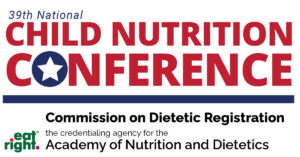




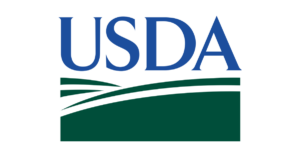

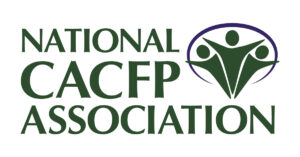
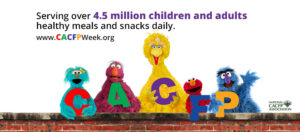


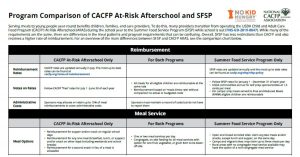

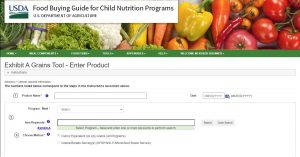
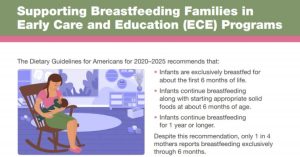









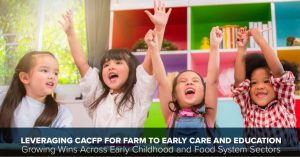





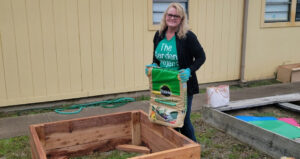

NCA Response – Request for Information on Grain-Based Dessert and High-Protein Yogurt Crediting
In December 2024, USDA released a request for information about grain-based dessert and high-protein yogurt crediting. After meeting with members and extensive research NCA has submitted our response to USDA stating our position on potential changes.
Read More